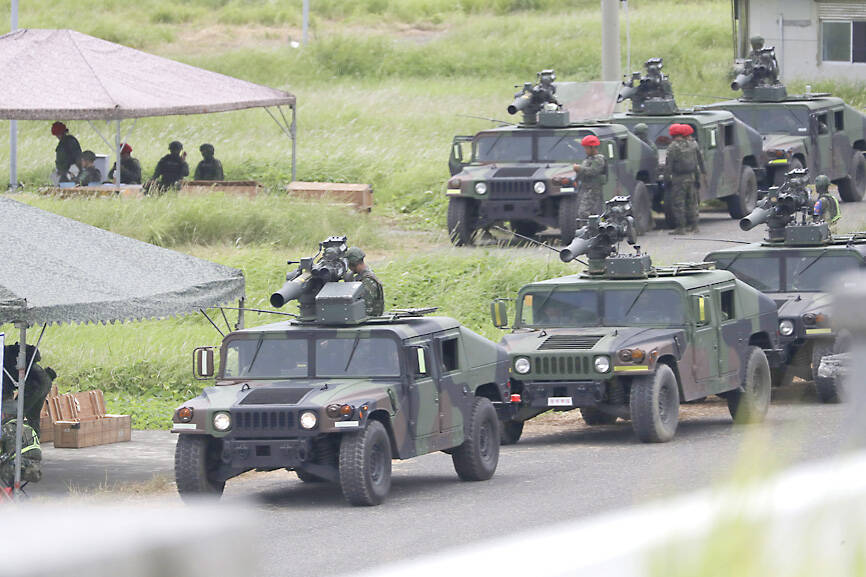Defense spending has yet to meet the Democratic Progressive Party’s (DPP) demands that it comprise 3 percent of GDP, with a report by the Legislative Yuan’s Budget Center early this month showing that it was at 2.14 percent, despite increasing spending and a special budget.
The DPP said in its 2014 Defense Blue Paper that defense spending by the administration of then-president Ma Ying-jeou (馬英九) did not reach 3 percent of GDP and was decreasing annually.
The paper urged the government at the time to increase spending to at least 3 percent of GDP.

Photo: Chiang Ying-ying, AP
The Budget Center’s report released on Aug. 1 showed that the annual budgets for the Ministry of National Defense from fiscal 2018 to fiscal 2023 under the DPP administration increased each year from NT$327.7 billion (US$10.25 billion) for 2018 to NT$409.2 billion for this fiscal year.
This year’s budget had NT$178.7 billion, or 43.66 percent, earmarked for “personnel operations,” NT$133.6 billion (32.64 percent) for “operations maintenance” and NT$97.0 billion (23.70 percent) for “military investment,” the report said.
The ministry also received a special budget of NT$45 billion for a new fighter jet program and NT$63.2 billion for its naval and air combat capability enhancement plans, bringing the ministry’s total budget to NT$517.5 billion, it said.
The report said that the overall budget is still experiencing difficulty due to rising costs for personnel and operations, which eat into the fund that can be used for equipment.
Payments for multiple foreign arms purchases need to be made soon, so the ministry must ensure that it has enough to fund autonomous defense programs, it added.
Institute for National Defense and Security Research analyst Shu Hsiao-huang (舒孝煌) on Wednesday said that if the government wants to have 3 percent of GDP spent on defense, it should foster systematic growth of spending instead of relying on special budgets.
With inflation taken into account, defense spending is not growing as much as the figures indicate, Shu said.
The ministry’s most significant problem is Taiwan’s declining birthrate, he said, adding that the military should consider sweeping changes to how it is structured and equipped, and introduce high technology and automated means to mitigate the lack of personnel.

‘DENIAL DEFENSE’: The US would increase its military presence with uncrewed ships, and submarines, while boosting defense in the Indo-Pacific, a Pete Hegseth memo said The US is reorienting its military strategy to focus primarily on deterring a potential Chinese invasion of Taiwan, a memo signed by US Secretary of Defense Pete Hegseth showed. The memo also called on Taiwan to increase its defense spending. The document, known as the “Interim National Defense Strategic Guidance,” was distributed this month and detailed the national defense plans of US President Donald Trump’s administration, an article in the Washington Post said on Saturday. It outlines how the US can prepare for a potential war with China and defend itself from threats in the “near abroad,” including Greenland and the Panama

The High Prosecutors’ Office yesterday withdrew an appeal against the acquittal of a former bank manager 22 years after his death, marking Taiwan’s first instance of prosecutors rendering posthumous justice to a wrongfully convicted defendant. Chu Ching-en (諸慶恩) — formerly a manager at the Taipei branch of BNP Paribas — was in 1999 accused by Weng Mao-chung (翁茂鍾), then-president of Chia Her Industrial Co, of forging a request for a fixed deposit of US$10 million by I-Hwa Industrial Co, a subsidiary of Chia Her, which was used as collateral. Chu was ruled not guilty in the first trial, but was found guilty

A wild live dugong was found in Taiwan for the first time in 88 years, after it was accidentally caught by a fisher’s net on Tuesday in Yilan County’s Fenniaolin (粉鳥林). This is the first sighting of the species in Taiwan since 1937, having already been considered “extinct” in the country and considered as “vulnerable” by the International Union for Conservation of Nature. A fisher surnamed Chen (陳) went to Fenniaolin to collect the fish in his netting, but instead caught a 3m long, 500kg dugong. The fisher released the animal back into the wild, not realizing it was an endangered species at

DEADLOCK: As the commission is unable to forum a quorum to review license renewal applications, the channel operators are not at fault and can air past their license date The National Communications Commission (NCC) yesterday said that the Public Television Service (PTS) and 36 other television and radio broadcasters could continue airing, despite the commission’s inability to meet a quorum to review their license renewal applications. The licenses of PTS and the other channels are set to expire between this month and June. The National Communications Commission Organization Act (國家通訊傳播委員會組織法) stipulates that the commission must meet the mandated quorum of four to hold a valid meeting. The seven-member commission currently has only three commissioners. “We have informed the channel operators of the progress we have made in reviewing their license renewal applications, and